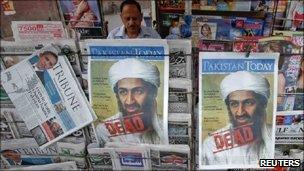Viewpoint: Bin Laden's death opens Afghan exit path
- Published

The condition of Pakistan is the single biggest issue in the struggle against terrorism
The death of Osama Bin Laden is a triumph for the United States, which may considerably reduce the terrorist threat to the US and the West.
This has little to do with the end of Bin Laden's leadership of the original al-Qaeda, since that leadership has long been mainly symbolic.
Indeed, it does not have much to do with the original al-Qaeda at all, since that group's power has been greatly reduced since 9/11, and it is now less threatening than a range of al-Qaeda allies and affiliates in Pakistan, the Middle East and beyond.
Rather, the main significance of this US success lies in its potential impact on the war in Afghanistan.
Will the Obama administration essentially be able to use it to declare victory in Afghanistan, and get out?
If so, the end to what is widely seen in the Muslim world - and especially Pakistan - as the illegal occupation of a Muslim country should diminish the appeal of militancy in Pakistan and the Pakistani diaspora, and reduce terrorist recruitment.
Additional anger
To judge by my numerous interviews with ordinary Pakistanis in recent years, the prestige of the Afghan Taliban's so-called defensive jihad against US invasion and occupation has been one of the main factors in driving the spread of militancy in Pakistan and in the Pakistani diaspora in Britain and elsewhere.
An additional factor in destabilising Pakistan has been US pressure connected to the war in Afghanistan - including drone strikes and the growing activity of US special forces within Pakistan.
The immense size of Pakistan's population and army make the condition of that country the single biggest issue in the struggle against terrorism.
As to the direct terrorist threat from the old al-Qaeda, to some extent in recent years they have been functioning less as a terrorist group in their own right than as providers of expert help to other groups.
Operationally, these groups will be wholly unaffected by Bin Laden's death. On the one hand, they were not under his control. On the other, they were already dedicated to attacking the West, and any additional anger caused by his death will only be one more factor amidst a plethora of real or perceived reasons their supporters have to attack the West.
You could almost say that for some time now, the greatest importance of the original, "core" al-Qaeda has lain in the collective mind of the United States. Therein may - but only may - lie the true significance of Bin Laden's death.
Talking to the enemy
The killing of the man seen as chiefly responsible for the murder of thousands of Americans on 9/11 is being seen in the US as a great victory for America and especially for the Obama administration, reflecting the perseverance, skill and courage of US intelligence and US special forces - and the moral courage of the president in ordering an operation which, had it gone wrong, could have become a debacle.
White House Press Secretary Jay Carney: Bin Laden not armed, but did resist
Because it is seen as a great victory, Bin Laden's death should help Barack Obama win re-election next year, and may also make it easier for the Obama administration to seek a peace settlement with the Taliban in Afghanistan and to withdraw US troops from that country, without this being seen by the US public as a humiliating defeat.
The possible contours of a peace settlement in Afghanistan are already apparent. They include:
The exclusion of all non-Afghan armed forces from the country - both international terrorists and US troops
A government in Kabul with some Taliban members
Limited Taliban control of certain areas, and a Taliban crackdown on heroin production in those areas
The Obama administration has positioned itself well to exploit his death in this way if it chooses to do so, by repeatedly emphasising that the war in Afghanistan is not against the Taliban as such, but only against their shelter for al-Qaeda.
This approach has, however, run up against a decade of US portrayals of the Taliban as enemies who must be destroyed - and the visceral opposition of the US military to a deal with the enemy.
The killing of Bin Laden should reduce greatly the sting of talking with the Afghan Taliban, and the ability of the Republican opposition in the US to portray this as "weakness" or "treachery" on the part of the Obama administration.
The Republicans may say this anyway, and will convince their core supporters - but they will be much less convincing to the undecided middle ground of US public opinion, which will decide the outcome of next year's US presidential elections.
If the Republicans do take this line, Bin Laden's death has now given the Obama administration a ready answer.
Professor Anatol Lieven is author of Pakistan: A Hard Country, published this week.